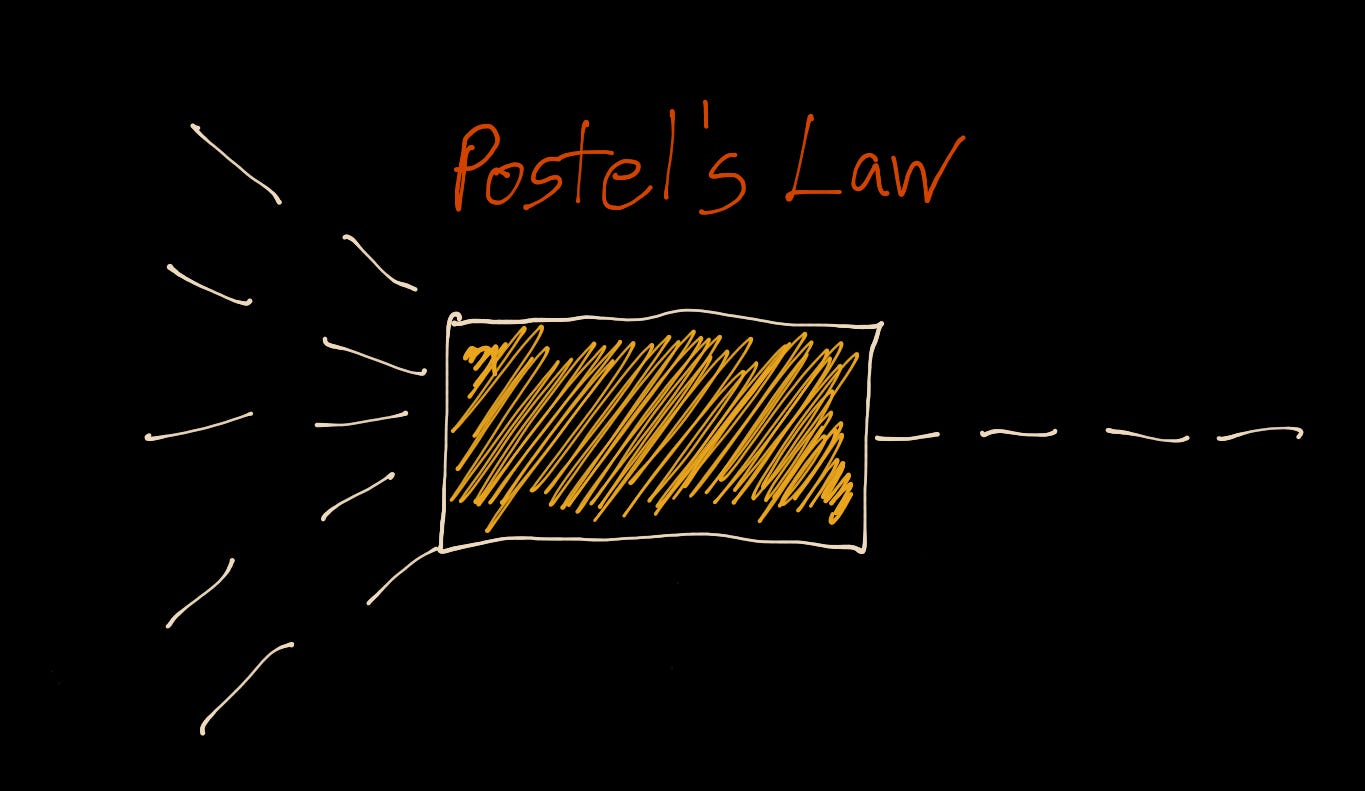Unpacking Postel's Law
What can we learn from the robustness principle and how can it help us hold ourselves to a higher standard while cultivating empathy for others?
Postel’s Law states: “Be liberal in what you accept, and conservative in what you send.” Also known as the Robustness Principle, it is a concept in computing popularized by Jon Postel in the development of the internet that significantly impacted standards adoption. While this principle was intended for computing, it is beautiful general advice for life. When applied to our interpersonal skills, we can frame the principle as follows:
Be empathetic with others, but hold yourself to a higher standard
I find it deeply rewarding to follow through on my commitments. When I commit to a principle, a routine, or a timeline, I try to hold myself to that standard to be reliable to others. By being faithful to others, they can trust that what I say will happen will happen. At the same time, while I appreciate reliability from others, it’s also important that I practice empathy when I’m on the receiving end of a commitment. Life happens, we all make mistakes, and unforeseen events get in the way of expectations. Being accommodative, generous, and empathetic is the essence of the Robustness principle. It’s prosocial behavior in which each of us tries to be our best while also being resilient enough to deal with externalities that aren’t perfect.
Of course, the Robustness Principle has its critics and limitations. Namely, you can be so accommodating that you endanger yourself or others. In the early days of the internet, it was primarily run by idealistic academics excited to push the boundaries of new technology. But over time, as the internet grew, “being liberal in what you accept” was exploited by bad actors who wanted to break protocols and cause harm maliciously. This has led to a movement to be much less accommodative in critical aspects (such as negotiating cryptographic protocols).
Again, we should also listen to these critics in our own lives. It is certainly possible to be too accommodating. Some people will exploit your empathy and generosity to the point that it can cause harm. As with all principles, keeping a scope to what we allow into our lives is essential. My threshold is to engage with the world to maximize serendipity while minimizing harm. I welcome perspectives and interactions that I couldn’t imagine myself, but I work to protect my time, focus, and privacy.
What’s your experience with the robustness principle? Do you feel you’ve taken things to one extreme or the other? How would you improve your interpersonal relationships if you worked on being more reliable in your commitments to yourself or others? Are you maximizing serendipity in your life, or do you suffer from being too accommodative? What could you experiment with in your life to try Postel’s Law?
This Week’s Notable Links
I’m about halfway through the audiobook of A Mind At Play by Jimmy Soni and Rob Goodman (Affiliate Link1). I started it while researching Claude Shannon’s Ultimate Machine post last week. It’s a fantastic book so far. I was already a fan of Claude Shannon, but this book has taken that appreciation to new depths.
I caught wind of the Mojo Programming Language this week. It claims “[to combine] the usability of Python with the performance of C.” I tried to write it off at first due to the very bold claims it seemed to be making, but with Chris Lattner as the language designer (LLVM, swift), I can’t ignore it. I know I’ll be keeping an eye on it over time.
I earn from qualifying purchases as an Amazon Associate.




